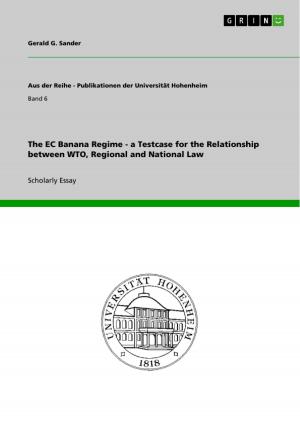Highly skilled labour migration: Consequences for labour exporting countries
Business & Finance, Economics, International| Author: | Johanna Avato | ISBN: | 9783638426114 |
| Publisher: | GRIN Publishing | Publication: | October 11, 2005 |
| Imprint: | GRIN Publishing | Language: | English |
| Author: | Johanna Avato |
| ISBN: | 9783638426114 |
| Publisher: | GRIN Publishing |
| Publication: | October 11, 2005 |
| Imprint: | GRIN Publishing |
| Language: | English |
Diploma Thesis from the year 2004 in the subject Economics - International Economic Relations, grade: 1.3, University of Applied Sciences Bingen (Lehrstuhl für Internationale Wirtschaftspolitik), 100 entries in the bibliography, language: English, abstract: The emigration of highly skilled people, the so-called brain drain (BD) has prompted a significant amount of literature, and suggestions about consequences of high skilled mobility for sending countries (SCs) are numerous but rather ambiguous. Historically, two major approaches can be distinguished. A negative view of the detrimental consequences for SCs due to the loss of human capital, and hence an increasing inequality among least developed countries (LDCs) and developed (DCs) (SCs and receiving countries (RCs)) characterised the discussion in the 1960s and 1970s. This view was intensified by the end of the 1980s, as the new growth theory stressed the importance of human capital as the main driver of economic growth. Accordingly, the loss of human capital would deprive SCs of a major prerequisite for growth and permanently hamper development. Lately, however, this pessimistic vision of accentuating the disadvantages for growth in SCs has been challenged by a more positive point of view. Expatriates are not seen as a loss anymore but instead as a resource which can be employed in favour of the SC. Rather pragmatically, this transnational view admits that, as long as incentives such as inequalities in many areas persist, highly skilled migrants cannot be hindered from moving. Therefore, newer theories focus on the advantages that SCs can draw from linking to their diaspora. Indeed, following this theory, SCs can seize numerous opportunities to manage international migration to offset its inevitable disadvantages, thus effectively turning the brain drain into a brain gain. It will be the aim of this paper to analyse whether the more recent view of international mobility of highly skilled workers can really countervail the concerns typical of the more traditional view. Will the LDCs be able to benefit from their expatriate HC or will migration enlarge disparities between SCs and RCs and consequently increase emigration even further? To address this question the following parts will give an overview on migration flows, present the underlying theories of the different approaches and assess existing empirical findings on the impact of the BD. Finally, policy implications will be outlined before concluding the paper.
Diploma Thesis from the year 2004 in the subject Economics - International Economic Relations, grade: 1.3, University of Applied Sciences Bingen (Lehrstuhl für Internationale Wirtschaftspolitik), 100 entries in the bibliography, language: English, abstract: The emigration of highly skilled people, the so-called brain drain (BD) has prompted a significant amount of literature, and suggestions about consequences of high skilled mobility for sending countries (SCs) are numerous but rather ambiguous. Historically, two major approaches can be distinguished. A negative view of the detrimental consequences for SCs due to the loss of human capital, and hence an increasing inequality among least developed countries (LDCs) and developed (DCs) (SCs and receiving countries (RCs)) characterised the discussion in the 1960s and 1970s. This view was intensified by the end of the 1980s, as the new growth theory stressed the importance of human capital as the main driver of economic growth. Accordingly, the loss of human capital would deprive SCs of a major prerequisite for growth and permanently hamper development. Lately, however, this pessimistic vision of accentuating the disadvantages for growth in SCs has been challenged by a more positive point of view. Expatriates are not seen as a loss anymore but instead as a resource which can be employed in favour of the SC. Rather pragmatically, this transnational view admits that, as long as incentives such as inequalities in many areas persist, highly skilled migrants cannot be hindered from moving. Therefore, newer theories focus on the advantages that SCs can draw from linking to their diaspora. Indeed, following this theory, SCs can seize numerous opportunities to manage international migration to offset its inevitable disadvantages, thus effectively turning the brain drain into a brain gain. It will be the aim of this paper to analyse whether the more recent view of international mobility of highly skilled workers can really countervail the concerns typical of the more traditional view. Will the LDCs be able to benefit from their expatriate HC or will migration enlarge disparities between SCs and RCs and consequently increase emigration even further? To address this question the following parts will give an overview on migration flows, present the underlying theories of the different approaches and assess existing empirical findings on the impact of the BD. Finally, policy implications will be outlined before concluding the paper.















